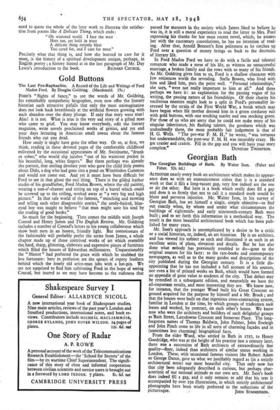Gold Buttons
FORD'S "flights of fancy," to use the words of Mr. Goldring, his remarkably sympathetic biographer, even now offer the literary historian such attractive pitfalls that only the most unimaginative does not look back breathlessly at the artificial flowers growing with such abandon over the dizzy plunge. If only that story were true! Alas! it is not. What is true is the very sad story of a gifted man who came to grief. You may know everybody, edit the literary magazine, write novels proclaimed works of genius, and yet end your days lecturing in American small towns about the famous friends who cut you dead.
How easily it might have gone the other way. Or so, at first, we think, reading in these devoted pages of the comfortable childhood enlivened by the occasional appearances of Mr. Swinburne, "drunk or sober," who would slip jujubes "out of his waistcoat pocket in his beautiful, long, white fingers." But there perhaps was already the portent, that smiling desolate poet who gave the child little poems about Dido, a dog who had gone into a pond on Wimbledon Common and would not come out. And yet it must have been difficult for Ford to see in that ghost the real thing. There is the gilded leather studio of his grandfather, Ford Madox Brown, where the old painter, wearing a tam-o'-shanter and sitting on top of a barrel which could be screwed up to the ceiling, worked away at "a very big and high picture." In that safe world of the famous, " minching and mowing and telling each other disagreeable stories," the sandy-haired, blue- eyed boy was taught to believe "that man might save his soul by the reading of good books." So much for the beginning. Then comes the middle with Joseph Conrad and Henry James and The English Review. Mr. Goldring includes a number of Conrad's letters to his young collaborator which show both men in an honest, friendly light. But connoisseurs of the fashionable will probably prefer the series from James, a whole chapter made up of those contrived works of art which resemble the, hard, sharp, glittering, elaborate and expensive pieces of furniture which filled the houses of Edwardian millionaires. Unquestionably the "Master" had perfected the grace with which he snubbed the less fortunate: here in profusion are the sprays of osprey feathers behind which the lonely old artist-man jabs with a hat-pin. We are not surprised to find him cultivating Ford in the hope of seeing Conrad, but inured as we may have become to the rudeness that passed for manners in the society which James liked to believe he was in, it is still a moral experience to read the letter to Mrs. Ford expressing his thanks for her most recent novel, which, he assures her with the customary convolutions, he has no intention of read- ing. After that, Arnold Bennett's firm politeness as he catches up Ford over a question of money brings us back to the decencies of literary life.
In Ford Madox Ford we have to do with a facile and talented romancer whci made a mess of his life, as witness an unsuccessful marriage a broken family and the rows with so many of his friends. As Mr. Goldring gives him to us, Ford is a shallow character with few reticences worth the revealing. Stella Bowen, who lived with him and liked him, puts the point well. "Personal relationships," she says, "were not really important to him at all." And there perhaps we have it: an explanation for the passing vogue of his writing, the passing nature of his friendships. Of their charity his vociferous enemies might look to a split in Ford's personality in- creased by the strain of the First World War, a break which may have begun when his mother dressed him in a green corduroy suit with gold buttons, with one stocking scarlet and one stocking green. For those of us who are sorry that he could not make more of his singular inheritance, his flashing talents' the goodness which was undoubtedly there, the most probably fair judgement is that of H. G. Wells. "The pre-war F. M. H.," he wrote, "was tortuous but understandable, the post-war F. M. H. was incurably crazy. He got crazier and crazier. Fill in the gap and you will have your story






























 Previous page
Previous page